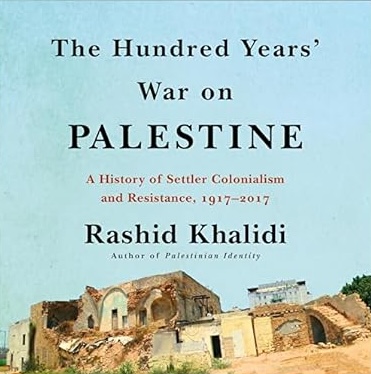A Review of Rashid Khalidi’s The Hundred Years’ War on Palestine
Reading AudaciouslyDr. Gale A. Yee, Nancy W. King Professor of Biblical Studies emerita, Episcopal Divinity School
Published 04 October 2024

For the CLBSJ Read-A-Thon, I chose to read Rashid Khalidi’s The Hundred Years’ War on Palestine: A History of Settler Colonialism and Resistance, 1917-2017 (New York: Henry Hold and Company, 2022). Before I move on to my report, I would like to provide a little context.
I am a retired professor of Hebrew Bible/Old Testament and have been to Israel/Palestine four times. The first time was during the 1987 Intifada when I had a fellowship from the National Conference of Christians and Jews to study at the Shalom Hartman Institute in Jerusalem. In 1988, I was a Scholar in Residence in an Interfaith Feminist Tour of Israel, led by a Jewish woman who worked for B’nai B’rith and the Anti-Defamation League of Minneapolis, MN. In 2015, I was on my first and last archaeological dig in Jezreel, Israel/Palestine, run by Jewish and Israeli archaeologists. Needless to say, I was primarily inculcated with the Israeli perspective during these three trips. My powerful first-hand experiences of the Jewish people and the land helped me understand the biblical text in new and compelling ways. But I was politically and theologically ignorant of the Palestinians and their oppressive subjugation by the Israeli government. It was only on my fourth trip in 2018 – led by two Palestinians who live at my retirement community, Pilgrim Place – that my worldview was completely transformed. During this two-week tour of the Occupied Territories, I saw the refugee camps, check points, and the tall walls that scarred the land. I visited Palestinian institutions and organizations that opened my eyes to the humiliating situations that the Palestinians faced daily. Because of this life-changing experience and because of the current conflicts in Gaza, I chose this book by Khalidi to read.
The wealth of this excellently researched book on the hundred-year history of Palestine, the density of the writing, and the complexity of the subject matter was not easy reading. I continually had to consult the Index to get my bearings on the diversity of events, peoples and places. What definitely helped the book’s accessibility was Khalidi’s intermingling of his own families’ personal involvements in Palestine’s political history.
There were two main take-aways for me from reading this book. First, Israel probably would not have come into being as a nation and a world power without the colonial involvement of two mighty empires, Britain and the United States. Despite forceful protests domestically and globally, the US imperium continues to send bombs and other military aid to Israel in its genocidal shelling of Gaza. The second is that Israel has a long history of dismissing any critiques of its violent overreach by the American administration. This puts Netanyahu’s blithe disregard to Biden’s weak admonitions against the bombings of Gaza that have killed thousands of Palestinians, especially children, into context. For a summary of Khalidi’s thesis and his thoughts since Hamas’s horrendous attack on Oct. 7, 2023, please see https://qantara.de/en/article/new-phase-middle-east-conflict-history-and-war-gaza. (Click the blue box in German to bypass the cookies.)
CLBSJ asked me to respond to the following questions after reading this book: “How does this text relate to the Bible’s message? How does it let me hear that message in new ways?” As is well known, the Book of Joshua chronicles God’s commission to Moses to cross the Jordan into the land that God has given the Hebrew people: “a land from the wilderness and the Lebanon as far as the great river, the river Euphrates, all the land of the Hittites, to the Great Sea in the west” (Joshua 1:4). Carrying the ark of the covenant as a talisman, the Hebrews proceed to violently conquer and drive out the indigenous peoples of the land: the Canaanites, Hittites, Hivites, Perizzites, Girgashites, Amorites, and Jebusites (Joshua 3:10). Khalidi’s book reveals to me that the “conquest of Canaan” is now taking place in a horribly new form with the latest destructive military technology. Right-wing Israelis continue to utilize the biblical book Joshua and other biblical passages today to legitimize their occupation of the land. In a recent CLBSJ presentation, Palestinian theologian Dr. Mitri Raheb provided an excellent discussion of how Zionists organized bible study groups on the text of Joshua to extract military strategy in the colonization of “Judah and Samaria.” You can watch the archive and access a study guide at https://clbsj.org/events/2024/01/27/the-bible-and-settler-colonialism-in-palestine-and-beyond/.
As a biblical scholar, I know that many ethnic groups, nations, and empires have long desired that piece of land called the Levant, the region along the eastern Mediterranean shores, roughly corresponding to modern-day Israel/Palestine, Jordan, Lebanon, Syria. In ancient times, the Levant was a land bridge between two world powers, Egypt and Mesopotamia. Armies did not have to cross the hot and treacherous Arabian desert to reach the other empire. To use the biblical text ideologically as a real estate title to claim and transform Palestine into a Jewish state is deeply problematic now, especially when bolstered by the two imperial powers of Britain and the United States, as Khalidi convincingly argues.
To drive home the fact that many ethnic groups, nations, and empires have historically claimed This Land is Mine, I ask you to click on this video, which depicts this bloody reality powerfully through animation: https://blog.ninapaley.com/2012/10/01/this-land-is-mine/. After the video, you can scroll down to find out which group the cartoon character represented. As the video makes clear, the current conflict in Israel/Palestine is unsustainable. It can only lead to complete annihilation.
In the Book of Joshua, the brutal conquest of indigenous peoples commanded by God is extremely challenging theologically. As we have seen, this text has been used to justify the Zionist claims to make Palestine a Jewish state. The book has also been used ideologically throughout periods of Western colonialism in places such as the Americas, Africa, Asia, and Australia. Biblical scholars have wrestled with the historicity of the book. Although some claim that there was an actual conquest, others claim it was a peaceful immigration. Norman Gottwald, the esteemed founder of CLBSJ, argues that the conquest narratives reflect internal struggles within the Canaanite population itself (without an invasion from the outside). He maintains that the Deuteronomistic redactors reshaped the earlier traditions of the Book of Joshua hundreds of years after the events themselves. For them, the total annihilation of Canaanites and their false gods had been mandated by God and should have been carried out by their ancestors. However, the Book of Judges, the next book in the Deuteronomistic history, reveals that the ancestors did not exterminate the Canaanites, because the text relates that their foreign gods began to “seduce” the new settlers. Israel’s infidelity to its covenant with God continues all the way to Israel’s exile from the land.
In its final redaction, the plain reading of the book of Joshua in which God mandates violence to claim a land belonging to another people is actually an invitation to us. We are bidden to continue to wrestle with problematic texts, as biblical scholars like me have been doing since their canonization. Toward this end, CLBSJ has developed a “Bible Detox” practice that create spaces for acknowledging the ways that the Bible has been weaponized to sanctify violence, confessing that this is part of our religious legacy, working through the painful contradictions that this has created in our spiritual lives (some might call this “decolonizing”), and seeking new readings that give life. By reading the Bible in this way, we help to disable its ability to be used as a weapon.
